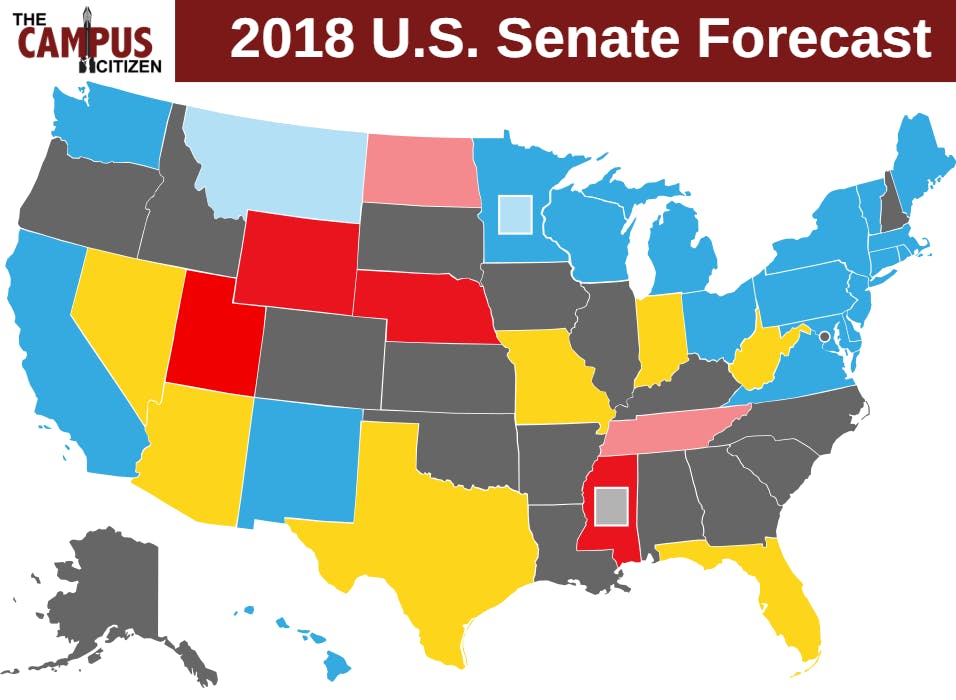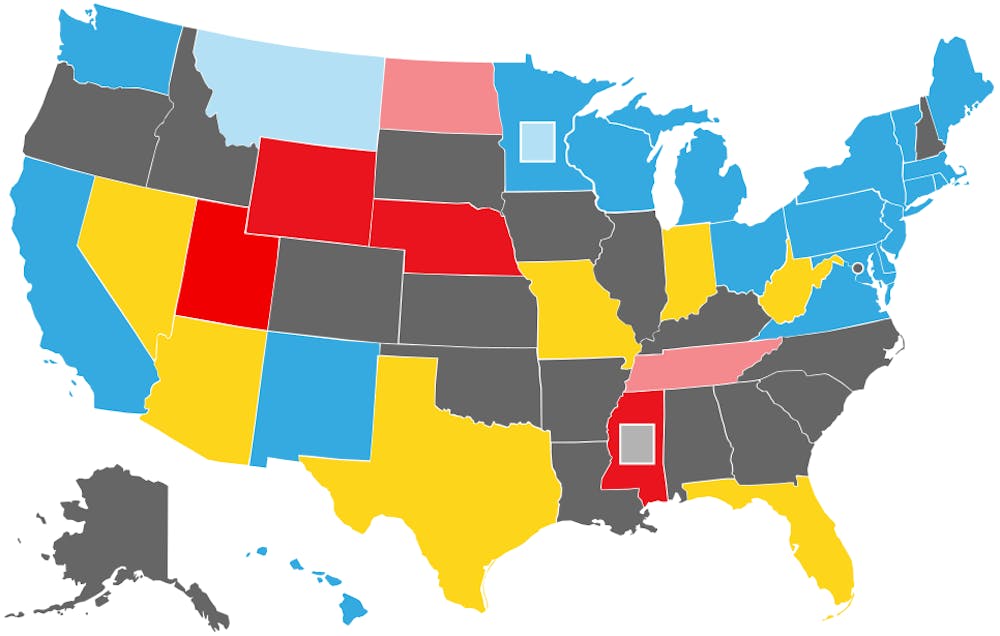Polls will close in most of Indiana less than 24 hours from now, but who will win Congress? Based on weighted averages of 366 polls, this is the Campus Citizen prediction for the Senate. Overall, the Republican Party is ahead or favored in 50 seats, enough to maintain control of the upper chamber with the tie-breaking power of Vice President Mike Pence (R-Ind.). But in decisive seats such as Missouri and Texas, the Republicans are ahead by less than 5 percent, and the overall result could range from Democrats beating their polls to retake the chamber or sustaining net losses. You can see who's ahead, where and by how much here, along with all of the polls used to create this forecast.

Arizona (Tilt Democratic) - 48.6 D, 48.4 R
After the retirement of Sen. Jeff Flake (R-Ariz.), this seat became one of the most competitive in the country. Rep. Kyrsten Sinema (D-Ariz.) is about even with Rep. Martha McSally (R-Ariz.), boasting a 0.1 percent lead in the weighted polling average. Arizona is one of a handful of states where 2016 presidential nominee Hillary Clinton (D-N.Y.) improved upon the performance of former President Barack Obama (D-Ill.), losing the state by under 4 percent. If Sinema wins, she would be the first Democrat elected to the Senate from Arizona since 1988. Either Sinema or McSally would also be the first woman to represent Arizona in the Senate.
Florida (Tilt Democratic) - 51.2 D, 48.8 R
Sen. Bill Nelson (D-Fla.) easily won re-election to this seat in 2012, so why is this even close? The answer is his opponent, Gov. Rick Scott (R-Fla.). Scott has used his stature and fortune to make this a competitive and expensive race, trading the lead with Nelson throughout the year. Nelson has recently pulled ahead in the polls, but his re-election is far from certain in a state infamous for its close elections.
Indiana (Tilt Democratic) - 47.9 D, 46.6 R, 5.5 L
Sen. Joe Donnelly (D-Ind.) was first elected to the Senate in 2012 as the result of circumstances that could be dismissed as a fluke. The popular Sen. Richard Lugar (R-Ind.) didn't even have a Democratic opponent in 2006 despite the blue wave sweeping the country at that time, but he couldn't overcome the frustrations of the Republican base in 2012. Lugar lost his primary to former State Treasurer Richard Mourdock (R-Ind.) that year. Mourdock then engendered nationwide condemnation for saying that God intended abortion caused by rape to happen during the second 2012 U.S. Senate debate in Indiana. Donnelly pulled ahead in the polls and won by less than 6 percent over Mourdock.
Donnelly has found his current opponent, Mike Braun (R-Ind.), much harder to defeat than Mourdock. Donnelly is ahead in the weighted polling average by 1.4 percent, and he has traded the lead with Braun in the waning days of the campaign. Braun has emphasized his status as an outsider, while Donnelly has stressed his bipartisanship. Whether or not Donnelly's strategy of appealing to the "Hoosier common sense" middle is a successful one will be borne out by the result of this race.
Missouri (Tilt Republican) - 47.5 D, 48.5 R
Josh Hawley (R-Mo.), the attorney general for Missouri, is about even with incumbent Sen. Claire McCaskill (D-Mo.), boasting a 1.0 percent lead in the weighted polling average. McCaskill's Republican opponent in 2012 committed a major gaffe when he claimed that women's bodies have a way of preventing rape if it's a "legitimate rape" during an interview. Hawley has not made any gaffes on a similar scale, and this combined with the Republican lean of the state of Missouri may prevent McCaskill from securing her third term as Senator.
Nevada (Tilt Democratic) - 46.8 D, 46.2 D
Incumbent Sen. Dean Heller (R-Nev.) represents a state that President Donald Trump lost in the 2016 presidential election. Heller has thus faced an uphill battle in securing re-election against Rep. Jacky Rosen (D-Nev.), who first won election to the House of Representatives in 2016. Rosen previously worked as a computer programmer before being asked to run by former Senate Minority Leader Harry Reid (D-Nev.). Rosen is about even with Heller, boasting a lead of 0.6 percent in the weighted polling average.
Texas (Tilt Republican) - 46.3 D, 50.7 R
Sen. Ted Cruz (R-Texas) has gone from a plausible 2016 presidential hopeful to barely holding onto his seat in the 2018 Senate election. Rep. Beto O'Rourke (D-Texas) is a three-term Congressman who has attracted national attention for his "Kennedyesque" charisma and his liberal stances on the issues. The ideological contrast between Cruz and O'Rourke is perhaps the widest of any competitive race in the country. For example, Cruz has called for a full repeal of the Affordable Care Act, while O'Rourke advocates for single-payer health care. Cruz opposes the Deferred Action for Childhood Arrivals (DACA) program, while O'Rourke favors comprehensive immigration reform. Cruz is about even with O'Rourke with a lead of 4.4 percent, and if O'Rourke wins, he would be the first Democrat to win statewide in the state since 1994.
West Virginia (Tilt Democratic) - 49.9 D, 46.1 R
West Virginia voted to elect President Donald Trump by over 42 points, making it the second-most Republican state in the 2016 presidential election. But Sen. Joe Manchin (D-W. Va.) first won his seat during the Republican wave of the 2010 midterm elections, and has made himself distinct from the national Democratic Party in the state through his opposition to regulations on the coal industry and firearms. Patrick Morrisey, the attorney general of West Virginia, now seeks to become the first Republican to be elected to Manchin's seat since 1956. Manchin is about even with Morrisey, with a lead of 3.8 percent in the weighted polling average.
Conclusion
The Republican Party is the narrow favorite for retaining control of the Senate, but the polling suggests they will likely lose the House of Representatives. This is consistent with the fact that the party that controls the White House usually sustains losses in Congress during the midterms. However, the unusually large number of Democratic seats up this year in states that President Donald Trump won has made the Democrats' quest to retake both chambers of Congress an uphill battle. And while an approximation of what may happen in the 2018 midterms can be suggested by the polls and seasoned prognosticators, only the voters can decide what will happen.
Polls will be open in Indiana from 6 a.m. to 6 p.m. local time on Tuesday, Nov. 6.
2018 Senate Predictions

Heads up! This article was imported from a previous version of The Campus Citizen. If you notice any issues, please let us know.
Base map courtesy of Wikimedia Commons. Yellow indicates Tilt Democratic or Tilt Republican, light blue indicates Lean Democratic, light red indicates Lean Republican, solid blue indicates Likely or Solid Democratic, solid red indicates Likely or Solid Republican. Squares inside of states represent special elections. Mississippi's special election, indicated in light gray, will advance to a runoff, the candidates of which have yet to be determined and thus no polling average is available.




